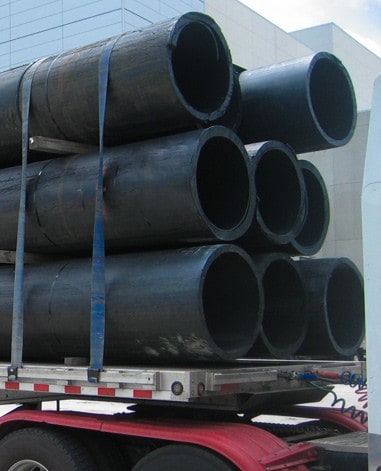Understanding the Key Benefits of HDPE Pipe for Water and Wastewater Administration
Making use of HDPE pipeline in water and wastewater management provides many benefits that warrant consideration. Its extraordinary longevity and long life expectancy make it a recommended selection for numerous projects. Furthermore, the material's resistance to rust and chemical damages boosts its integrity in various atmospheres. Nonetheless, the benefits prolong past just long life and resistance. Exploring its cost-effectiveness and environmental impact reveals much more compelling reasons for its widespread adoption in modern-day infrastructure
Exceptional Durability and Longevity

HDPE pipeline attracts attention for its exceptional toughness and longevity, making it a recommended selection in water administration systems. Constructed from high-density polyethylene, these pipes can endure considerable stress and stress and anxiety, guaranteeing trustworthy efficiency with time. Their robust nature allows them to withstand severe ecological problems, consisting of temperature variations and dirt activities, which can cause various other products to stop working.
The life-span of HDPE pipes commonly exceeds 50 years, offering a cost-efficient solution for towns and markets alike. In addition, the product's light-weight residential properties streamline installment, decreasing labor expenses and durations. This durability minimizes the need for regular repair work or replacements, even more boosting its economic appeal.
In water management applications, the dependability of HDPE pipelines indicates fewer disruptions and enhanced service connection, making them indispensable to lasting framework development. The mix of toughness and long life solidifies HDPE's role as a cornerstone in efficient water management remedies.

Resistance to Deterioration and Chemical Damages
While numerous products catch deterioration and chemical damage gradually, HDPE pipes display remarkable resistance, making them suitable for various water monitoring applications. This resilience originates from the molecular structure of high-density polyethylene, which is naturally non-reactive and does not corrode like steels or degrade from exposure to extreme chemicals. Consequently, HDPE is highly efficient in settings with aggressive compounds, such as wastewater systems that may consist of acids, bases, and natural solvents.
Additionally, HDPE pipes can stand up to ecological factors such as soil acidity and saline conditions, additionally boosting their viability for diverse applications (Midland TX HDPE Pipe Fittings in Stock). Their ability to maintain structural integrity over time decreases the threat of leakages and failures, which is essential in making sure the safety and integrity of water distribution and wastewater management systems. The resistance to corrosion and chemical damages considerably adds to the general efficiency and long life of HDPE piping solutions.
Cost-Effectiveness and Economic Benefits
When taking into consideration the monetary ramifications of water administration systems, the cost-effectiveness of HDPE pipes becomes apparent. These pipes offer reduced installment and upkeep expenses compared to conventional products like metal or concrete. Their lightweight nature simplifies transportation and installment, causing reduced labor costs. Furthermore, HDPE pipelines show a long life-span, frequently surpassing 50 years, which equates to fewer substitutes and lasting savings.
The resistance of HDPE to deterioration and chemical damage minimizes the demand for costly fixings and substitutes. The pipes likewise sustain effective water flow, reducing power prices connected with pumping systems. By alleviating leaks and water loss, HDPE pipelines add to considerable financial benefits for districts and industries alike. On the whole, the preliminary investment in HDPE piping water lines for house can generate significant financial returns over the life expectancy of the water monitoring system, making it a sensible choice for sustainable facilities growth.
Ecological Sustainability and Reduced Impact

Versatility and Adaptability in Setup
As a result of their special residential properties, HDPE pipelines supply amazing adaptability and adaptability in installation, making them ideal for a wide variety of applications. Their light-weight nature enables simpler handling and transportation, lowering labor expenses and setup time. HDPE pipes can be curved and formed to fit numerous surfaces and project needs, which is specifically valuable in testing atmospheres.
Furthermore, their resistance to corrosion and chemical damage permits for installation in varied settings without the demand for specialized safety coatings. The capacity to fuse joints produces a constant, leak-free system, improving the overall honesty and reliability of the setup. HDPE's versatility additionally fits ground activity, decreasing the danger of damages in locations prone to moving soil. On the whole, these attributes make HDPE pipelines not only versatile however additionally a favored choice for water and wastewater management systems.
Frequently Asked Concerns
Exactly How Does HDPE Pipeline Contrast to PVC in Water Monitoring Applications?
HDPE pipe offers remarkable adaptability, resistance to corrosion, and longevity compared to PVC. Its lighter weight assists in less complicated installation, while its long life expectancy lowers substitute expenses, making HDPE a favored choice in water management applications.
What Is the Lifespan of HDPE Pipeline Under Common Conditions?
Under normal conditions, HDPE pipelines can have a lifespan ranging from 50 to 100 years. gas pipe repair Their sturdiness and resistance to rust contribute to their long-term performance in different applications, making them a trustworthy option for facilities.
Are HDPE Pipeline Recyclable After Their Life Span?
Yes, HDPE pipelines are recyclable after their solution life. hdpe pipe in stock Midland TX. They can be processed and repurposed into brand-new items, substantially minimizing environmental influence and promoting sustainability within the market, making them a green option for piping services
What Is the Setup Refine for HDPE Water Lines?
The installation procedure for HDPE pipes includes site prep work, trenching, pipe blend or mechanical joining, backfilling, and stress screening. Appropriate techniques ensure a resilient and reliable system for transferring water and wastewater successfully.
Can HDPE Pipeline Be Made Use Of for Both Safe And Clean and Non-Potable Water Equipments?
Yes, HDPE pipelines can be utilized for both safe and clean and non-potable water systems. Their versatility, resilience, and resistance to rust make them ideal for various applications, ensuring risk-free and reliable transport of water in different contexts.